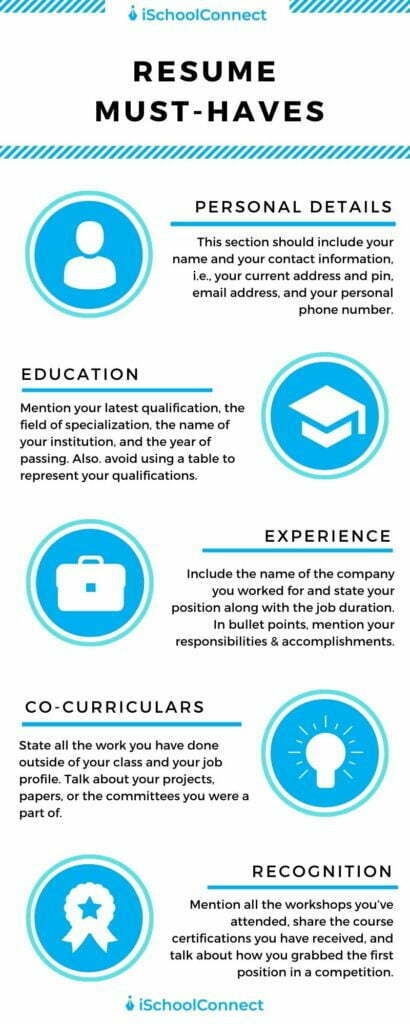Table of Contents
Resume for university | Here’s everything you need to know!
One of the most underrated parts of your college application, a resume is a one-page document that gives a brief overview of your achievements. It also highlights all the sides of your personality and shows who you are outside of school and work.
Since a resume comprises so many things, it’s important to write it effectively and in a manner that catches the admissions committee’s eye. The guidelines in this blog will make it very easy for you to draft your resume for university applications. Written well could earn you a spot in your dream university. Moreover, you can continue to use it for other applications as you grow professionally and personally.
What is the importance of a resume?
Universities receive thousands of applications every year. And each application consists of a good number of documents, including your academic records, an essay, letters of recommendation, test scores, and your resume. So, why is it necessary to spend so much time on a document that doesn’t seem so important?
Your resume showcases all your life accomplishments on a single page. If someone wants to see if you’re worthy of consideration, that’s the first thing they’re going to look at. Granted, they might not look at it for more than 10 seconds, but if your resume catches their attention, you’ve passed the first round.
How to write a resume for college?
I’m not saying there’s only one way of doing this, but a resume usually consists of the headings I’ve stated below. And even though you can’t change that, you can always experiment with the kind of content you write under each heading.
Personal details
This section should include your name and contact information, i.e., your current address and pin (as mentioned in your passport), email address, and personal mobile phone number. Make sure to include these details on the top of your resume and see that your name stands out.
Education
Your academic achievements are an important part of your resume. They showcase the primary subjects of your interest and how good you are at your studies. So, mention your latest qualification, the field of specialization, the name of your institution, and the year of passing. Follow that up with your previous qualifications, if necessary. Also, I personally suggest that you avoid using a table to represent your educational qualifications.
Work Experience
If you have relevant work experience, let it take up a good amount of space in your resume. Make sure to include the name of the company you worked for and state your position along with the job duration. In bullet points, mention your responsibilities and accomplishments at the organization, with each point taking up one to two lines at the max.
Co-curricular activities
You don’t necessarily have to title this section as ‘Co-curricular activities.’ You may also name it ‘Projects‘ or ‘Projects and publications.’ Here, you can state all the work you have done outside of your class and your job profile in relation to the subjects of your interest. You can talk about projects you’ve worked on, published papers, or committees and clubs you were a part of.

Recognition
Another section where you can brag (subtly) about yourself is ‘Recognition’ or ‘Awards and Certifications.’ You can mention all the workshops you’ve attended, share the course certifications you have received, and talk about how you grabbed the first position in a competition.
Extra-curricular activities
Mentioning your extracurricular activities will make you a three-dimensional being. It will show that you have other interests in life outside of school and work. Talk about your dance classes, how you learned graphic designing for the heck of it, or the way you cultivated your interest in horse riding. This is the place to brag (subtly) and talk about things you had not mentioned in your essay.
Community Service
It’s not compulsory for you to talk about your work as a volunteer or an intern at a charitable organization. So, if you haven’t done it, you can skip this section. But I should tell you that today, a lot of students take out a whole year to perform community service before going to college. So, if you wish, you can always work towards child education, women empowerment, or environmental protection and talk about it on your resume.
Skills
Your skills can be divided into two categories – hard and soft skills. Hard skills consist of acquired knowledge, like HTML, Google Analytics, or Excel. On the other hand, soft skills showcase your personal strengths, like communication, leadership, etcetera. A good mixture of both is needed to make your profile stand out as unique.
Hobbies and Interests
Your hobbies and interests don’t have to necessarily align with your subject of interest. But it’s always good to have a few hobbies that are related to it and a few others you find just as interesting. For example, you could be a Creative Writer who loves Reading (of course) but also someone who likes Sketching. Don’t shy away from sharing all the facets of your personality.
A university resume should include all of these details except the last three. Your skills and interests will get highlighted in other sections as well. So, you can skip them in case they don’t fit.
Resume writing tips you should keep in mind
It’s easy to get lost in the middle of drafting your resume for university. These seven resume writing tips will keep you on track and help ensure that your resume is well-crafted.

- The first and the most important piece of advice I’m going to give you is this – do not exceed a single page. Your resume should be a single snapshot of all your accomplishments, easy to comprehend in one glance.
- Everything should be included using three to four bullet points. Be it your contributions at work, co-curricular and extra-curricular activities, or volunteering experience. Even your certifications, hobbies, and skills should fall into single lines.
- Every bullet point you mention shouldn’t be more than one to one and a half lines. The more concise you are, the better your chances of having a one-page resume.
- Follow a single chronological order. Start from your latest accomplishments and move towards the earlier ones as you write.
- Use active voice instead of passive voice. Go for words like ‘Managed,’ ‘Achieved,’ ‘Conducted,’ ‘Designed,’ and ‘Authored’ to showcase your accomplishments.
- Have at least two to three things on your profile that will make your resume stand out. Let these achievements fall in line with the values that the university focuses on.
- Dot the I’s and cross the t’s. Make sure your spelling and grammar are correct. Even the smallest of mistakes can stand out because everything is within a single page. So, my last piece of advice to you is this – proofread, man. Proofread!
What is the correct resume writing format?
Writing is one thing. Presenting is another. And if the resume you write for university applications does not look pleasing to the eye, you’re doing it wrong. So, I suggest you use the following resume writing format-
- Use a single, standard font (like Times New Roman or Calibri) throughout your resume.
- Let all the headings be in bold and have a size of fourteen while keeping the size of the rest of your document as eleven or 12.
- Leave a margin of one inch on both sides.
- Keep enough space between each heading, subheading, and text. I know it’s difficult to fit so much within one page and still have space. But it’s important because having a lot of text in one document can make it look intimidating and uninviting.
- When you’re done, save your resume in PDF format.
Key takeaways
If you have reached this far, I have two more suggestions for writing the perfect resume for university applications-
- Be completely honest about yourself.
- And not just because it’s good practice but also because colleges can find inaccurate information.
- Once you’re finished writing your resume, send it to someone.
- Getting a second opinion is important.
- If you don’t know an expert you can share it with; you can get in touch with me.
- Or anyone from iSchoolConnect, for that matter.
We will be very happy to help! And I hope I was able to answer all your questions about how to write a resume for college.
Was this blog informative? If so, please share your thoughts in the comments below. Click here to reach out to us for more information on writing resumes for universities. We would be happy to assist you with your queries!
Liked this blog? Then read: Nail your university-specific SOP with these 5 incredible tips!
FAQs
Q1. What is a resume for university?
Answer – A resume is a summary of your academic and personal experiences, including before- and after-school activities, volunteer work, and/or jobs. Most colleges and employers want to see your resume when considering whether to admit or hire you.
Q2. What skills should I put on my university application?
Answer – Following are the skills that you should put on my university application-
- A positive attitude towards study.
- A passion for the chosen course subject.
- An ability to think and work independently.
- An ability to persevere and complete tasks.
- An inquiring mind.
- Good written English.
- An ability to work well in groups.
Q3. Do universities need resumes?
Answer – Some colleges require a resume with the application, while others welcome the document in the supplemental materials section. Some internship, scholarship, and study-abroad applications also require resumes.







What if I have relevant material to write which is more than 1 page?
Then you’ll have to make sure that the second page is also entirely filled
Don’t leave half or one-third of it blank